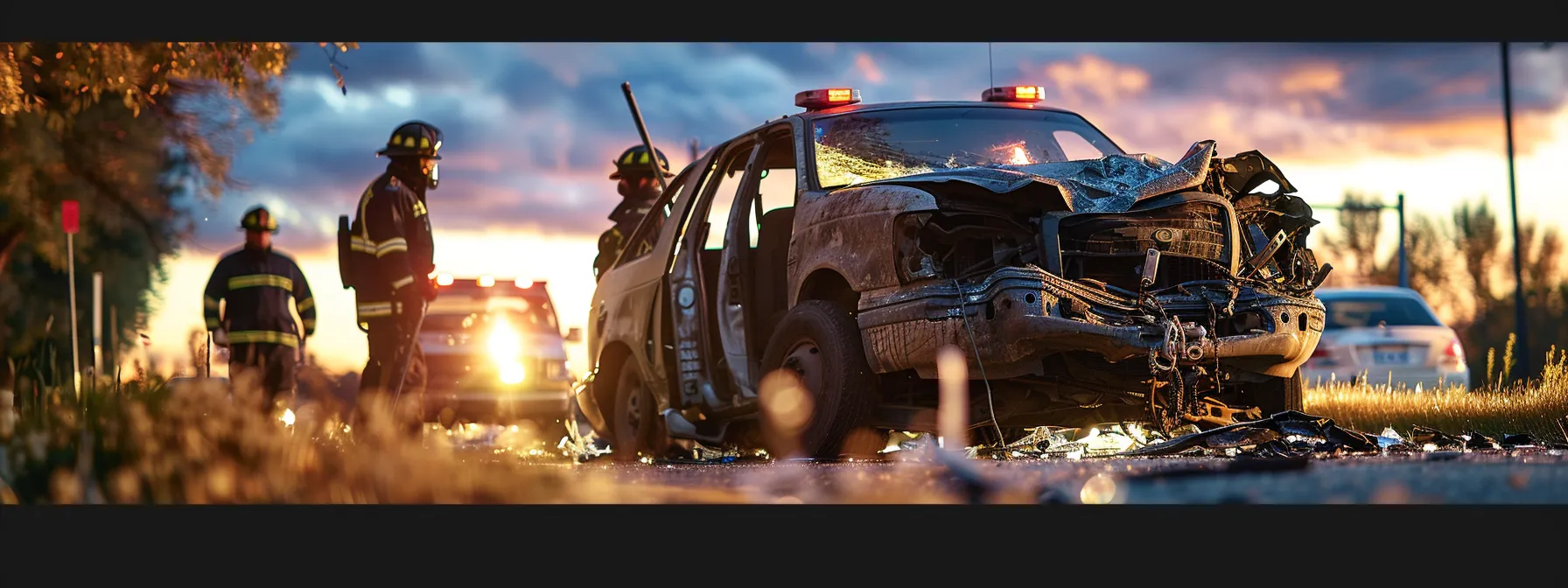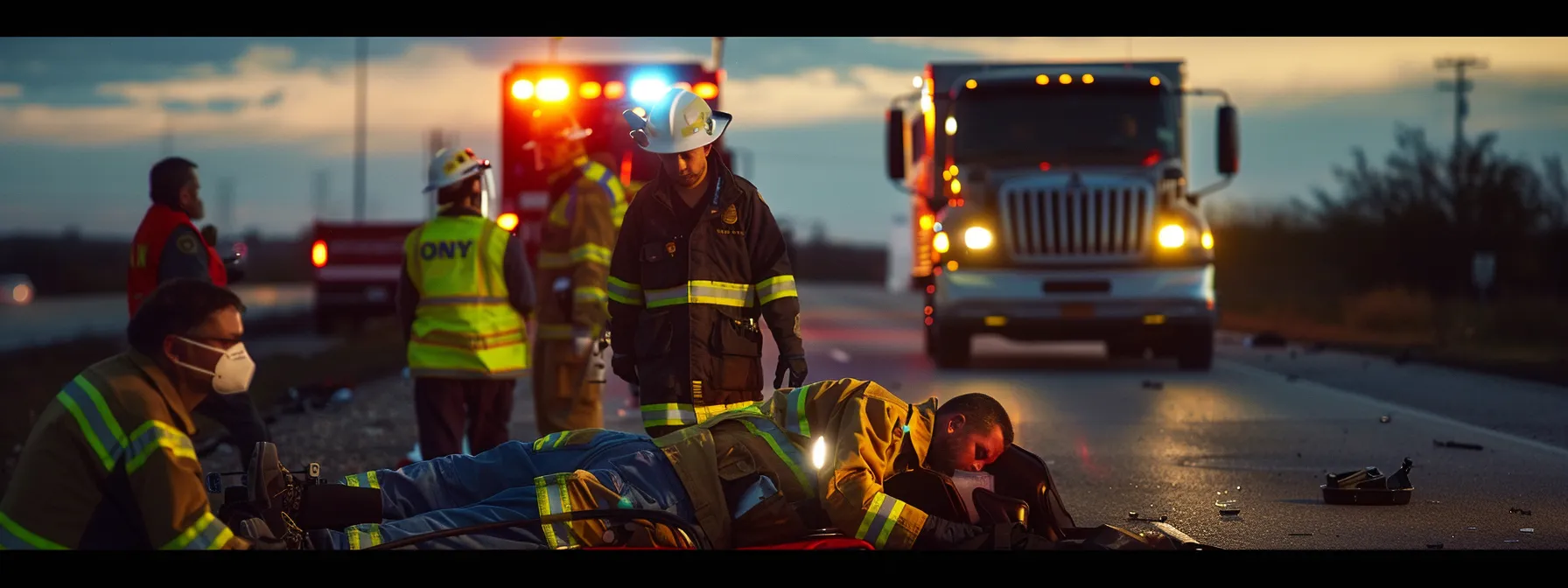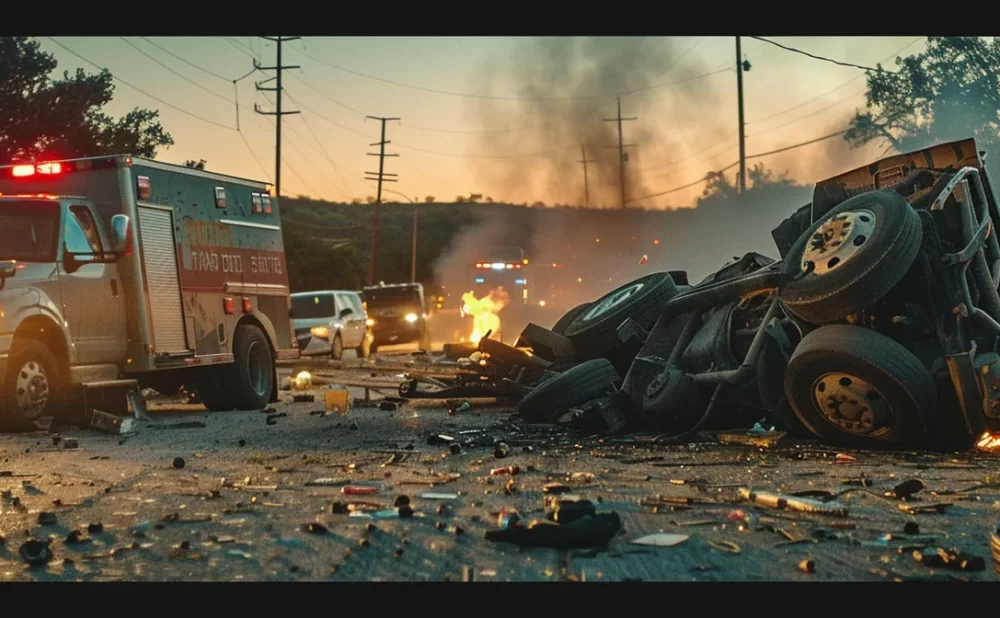Navigating the aftermath of a truck accident in Texas can be as complex as the state’s vast highways. This guide provides a thorough understanding of Texas truck accident laws, including the common causes of such accidents and the intricacies of determining liability. Readers will discover the crucial steps to take after an accident and the compensation they can claim. For those seeking justice and reparation, the Heil Law Firm stands ready to offer expert personal injury services. By engaging with this content, victims will arm themselves with the necessary evidence and knowledge to advocate for their rights. Should you find yourself in need of guidance, do not hesitate to contact us for support.
Key Takeaways
- Truck accidents in Texas require adherence to complex federal and state safety regulations
- Victims must act swiftly due to the statute of limitations for filing truck accident claims
- Comparative negligence in Texas can reduce compensation if the victim is partly at fault
- Trucking companies must maintain adequate insurance to cover liabilities from accidents
- A Texas truck accident lawyer is crucial for navigating legal complexities and maximizing compensation
Understanding Texas Truck Accident Laws

Truck accidents in Texas are governed by a complex interplay of federal and state regulations, designed to ensure the safety of all road users. The Federal Motor Carrier Safety Administration (FMCSA) sets forth stringent guidelines, including the Safety Measurement System (SMS), which trucking companies must adhere to. In the unfortunate event of a truck accident, victims face a statute of limitations that dictates the urgency of filing a claim.
Understanding the nuances of comparative negligence is crucial, as it can significantly impact the outcome of a case. Trucking companies are required to carry insurance that meets specific standards set by the Insurance Institute for Highway Safety, providing a safety net for those affected by accidents. Legal proceedings for truck accidents differ from those for car accidents, often involving more severe consequences such as disfigurement or catastrophic failure. Witnesses play a pivotal role in these cases, providing essential testimony that can influence the direction and result of a claim. For more information on personal injury services, contact us.
Federal and State Regulations for Commercial Trucks
In the realm of commercial trucking, federal and state regulations serve as the bedrock for maintaining safety and accountability on Texas roads. The Federal Motor Carrier Safety Administration mandates that commercial vehicles, such as 18-wheelers, are equipped with event data recorders, akin to an aircraft’s black box, to capture critical information during a collision. This data can be pivotal in assessing tire performance, driver actions, and other factors that may contribute to an accident, thereby influencing the compensation for victims’ medical expenses and quality of life disruptions. contact us for personal injury services.
State regulations complement federal laws by enforcing additional safety measures and insurance requirements to protect those involved in truck accidents. For instance, Texas law stipulates that commercial trucks must carry a minimum level of insurance coverage, ensuring that victims have a financial recourse for injuries sustained, which may include severe neck trauma. These combined regulations form a comprehensive framework designed to safeguard the well-being of all road users and provide a clear path to restitution in the event of a truck-related mishap. Visit Heil Law Firm or contact us for personal injury services.
- Event data recorders monitor truck performance and driver behavior.
- Insurance standards offer financial protection for accident victims.
- State-specific safety measures address unique regional road conditions.
Time Limits for Filing a Truck Accident Claim in Texas
After a truck accident in Texas, victims must recognize the time-sensitive nature of their legal rights. They must file any lawsuit within two years from the date of the accident, as required by the state’s statute of limitations. Acting within this time frame ensures regulatory compliance and allows for the preservation of critical evidence, such as maintenance records or the trailer’s condition, to support a personal injury claim.
Should surgery or long-term rehabilitation be necessary due to the accident, the financial burden can be overwhelming. Prompt action is not only a legal necessity but also a practical one, as it allows for the timely gathering of evidence and expert testimonies that are essential for a successful claim. The following list outlines the key steps to take following a truck accident:
- Document the accident scene and collect evidence.
- Seek immediate medical attention for an accurate assessment of injuries.
- Consult with a personal injury lawyer to understand your legal options.
How Comparative Negligence Affects Your Case
In Texas, comparative negligence significantly influences truck accident lawsuits and directly impacts the compensation a plaintiff receives. If the court determines that the plaintiff shares responsibility for the incident—such as failing to observe road signs or making an abrupt lane change on a motorcycle—it reduces their recoverable damages by their percentage of fault. This statute proportionately assigns liability, highlighting the need for a thorough investigation to establish the facts of the case.
When a plaintiff is less than 51% responsible for the truck accident, they remain eligible to pursue a lawsuit for their injuries and losses. However, the intricacy of proving negligence demands a robust legal strategy, often necessitating the expertise of an attorney well-versed in the nuances of Texas road laws. This professional guidance is invaluable in navigating the complexities of the legal system and maximizing the plaintiff’s rightful claim.
Insurance Requirements for Trucking Companies
Trucking companies operating within Texas are subject to stringent insurance requirements, a regulation that serves as a bulwark against the financial impact of truck accidents. In cases of gross negligence, where a truck driver’s actions, such as jackknifing, lead to severe accidents, the court may award substantial damages. It is therefore mandatory for these companies to maintain insurance policies that can cover such liabilities, ensuring victims in cities like San Antonio have access to just compensation for their injuries and losses.
The adequacy of a trucking company’s insurance coverage often comes under scrutiny during legal proceedings, especially when evaluating the extent of damage caused by a truck accident. This coverage is not merely a regulatory formality but a critical component that enables victims to recover costs associated with medical care, rehabilitation, and other damages. The court’s assessment of a company’s insurance safeguards can significantly influence the outcome of a truck accident lawsuit, highlighting the importance of robust insurance policies in upholding the rights of those affected.
Legal Differences Between Truck and Car Accidents
When distinguishing between truck and car accidents, one must consider the negotiation process, which is often more complex in truck accident injury cases. The sheer weight and size of commercial trucks can lead to more severe injuries, escalating the stakes in legal disputes. Settlement negotiators meticulously evaluate factors like the significant pain victims experience and the extensive medical treatment they require to ensure fair compensation.
Another key difference lies in the evidence available for truck accidents. Many commercial vehicles have dashcams that provide crucial footage, which can influence the outcome of a case. This visual evidence, combined with the truck’s weight logs and maintenance records, offers a more detailed account of the circumstances leading to an accident, thereby shaping the legal strategy and potential recovery for the injured party:
| Aspect | Car Accidents | Truck Accidents |
|---|---|---|
| Negotiation Complexity | Less complex, often between individuals | More complex, involving multiple parties |
| Evidence Type | Typically limited to photos and witness statements | Often includes dashcam footage and detailed vehicle logs |
| Injury Severity | Varies, but generally less severe | Often more severe due to truck weight and size |
Common Causes of Truck Accidents in Texas

Truck accidents in Texas often stem from a variety of causes, each contributing to the complexity of legal claims and the pursuit of justice for victims. Driver fatigue and hours-of-service violations represent a significant breach of safety regulations, potentially leading to catastrophic outcomes. Overloading and improperly secured cargo can also precipitate accidents, highlighting the importance of adherence to weight limits and securement standards. Mechanical failures and poor maintenance underscore the role of negligence in ensuring vehicle safety. Additionally, distracted and impaired driving remain prevalent issues, jeopardizing road safety. Lastly, hazardous road and weather conditions can exacerbate the risk of truck accidents, necessitating extra caution and preparedness. This section delves into these common causes, offering valuable information for those affected, including families facing funeral arrangements and individuals seeking to understand their rights in the aftermath of a truck accident.
Driver Fatigue and Hours-of-Service Violations
Driver fatigue is a critical factor in many truck accidents across Texas, where the relentless demands of the road can lead to drowsy driving and a lapse in concentration. When truck operators disregard hours-of-service regulations, the risk of a driver failing to brake in time or engaging in recklessness on the highway increases, endangering all road users. The aftermath of such negligence can be dire, resulting in injuries that may cause severe bleeding and necessitate urgent medical attention.
In the event of a truck accident attributed to driver fatigue, the testimony of an expert witness can be instrumental in elucidating the nuances of the crash. These specialists provide insights into how the violation of rest requirements can impair a driver’s reaction time and decision-making abilities, offering a compelling argument in personal injury cases. Their analysis often reveals a direct link between the lack of adequate rest and the tragic outcomes of truck accidents.
Overloading and Improperly Secured Cargo
Overloading a commercial vehicle, such as a dump truck, can lead to disastrous consequences on Texas roads. Excessive weight not only strains the vehicle’s braking system, increasing the risk of failure, but also contributes to tire blowouts and loss of control, often resulting in severe injuries or spinal cord damage. It is imperative for trucking companies and drivers to comply with weight regulations to prevent such perilous incidents.
Improperly secured cargo poses a significant safety threat. Shifting loads can cause a truck to overturn, especially during sudden maneuvers, leading to accidents that may result in whiplash or more serious harm to other road users. The driver and trucking company must secure all cargo properly, especially when tight schedules tempt them to skip these vital safety checks.
Mechanical Failures and Poor Maintenance
Mechanical failures in commercial transport are a significant contributor to truck accidents in Texas, often due to neglected maintenance or defective parts. When a truck driver loses control because of a brake failure or a malfunctioning steering system, the speed of the vehicle can make it impossible to avoid a collision, placing the fault squarely on the shoulders of the party responsible for the truck’s upkeep. These incidents underscore the critical importance of regular, thorough maintenance to prevent tragic outcomes on the road.
In the aftermath of truck accidents where poor maintenance is to blame, the evidence often points to a lapse in the rigorous safety checks required in the trucking industry. A truck driver may be unaware of the latent defects in their vehicle until it is too late, resulting in catastrophic accidents that could have been avoided with proper care. This highlights the need for trucking companies to prioritize the condition of their fleet as a non-negotiable aspect of their operations, ensuring the safety of all Texas road users.
Distracted and Impaired Driving
Distracted driving remains a leading cause of truck accident cases in Texas, where a momentary lapse in attention can have devastating consequences. Whether it’s due to a driver checking a navigation device or managing cargo documentation, these distractions can lead to a failure to observe traffic conditions, resulting in collisions. A claims adjuster will meticulously review the accident details, often relying on evidence such as phone records or in-cab camera footage to determine the role distraction played in the event.
Impaired driving is another grave concern, as it severely hampers a truck driver’s ability to operate their vehicle safely. When alcohol, prescription medication, or other substances impair judgment and reaction times, the risk of causing a serious accident increases. In such cases, a lawyer can provide invaluable assistance, guiding the victim or their parent through the complex legal landscape to ensure that justice is served and appropriate compensation is secured:
| Factor | Impact on Truck Accident Cases |
|---|---|
| Distracted Driving | Leads to a failure in observing traffic, resulting in collisions. |
| Impaired Driving | Reduces reaction time and judgment, increasing accident risk. |
Hazardous Road and Weather Conditions
Hazardous road and weather conditions in Texas can significantly increase the likelihood of truck accidents, often challenging even the most experienced commercial vehicle operators. The Federal Motor Carrier Safety Administration underscores the need for drivers to exercise caution under such circumstances, yet road rage and adverse weather can lead to critical errors in judgment. An advocate specializing in truck accident lawsuits understands the complexities these elements introduce, guiding victims through the legal process to address their grievances effectively.
When a commercial vehicle encounters slick roadways or reduced visibility, the risk of a catastrophic incident escalates, necessitating swift and decisive action from all parties involved. In these situations, the expertise of a lawyer becomes indispensable, as they possess the knowledge to navigate the intricacies of claims influenced by environmental factors. They thoroughly examine the nuances of each case, providing a clear path to justice for those affected by truck accidents exacerbated by hazardous conditions.
Determining Liability in a Truck Accident

In the aftermath of a truck accident in Texas, determining liability is a multifaceted process that involves various parties. The responsibilities of the truck driver, the liability of the trucking company, the role of manufacturers and maintenance providers, the impact of third-party brokers and loading teams, and the importance of collecting and preserving evidence are all critical elements. Each factor, from the Texas Department of Transportation’s regulations to the judge’s interpretation of lane usage at the time of the incident, can influence the outcome, especially in cases involving internal bleeding or death. This section provides a comprehensive examination of these aspects, offering essential insights into the legal intricacies of truck accident claims.
Responsibilities of the Truck Driver
In commercial truck accidents, the truck driver’s responsibilities play a crucial role in determining liability, especially when personal injury or property damage occurs. Drivers must adhere to all traffic laws, maintain their vehicle properly, and stay vigilant to protect the safety of all passengers and road users. Failing to meet these obligations can hold the driver accountable for any resulting damages.
Moreover, in the intricate landscape of personal injury law, the actions of the truck driver before and during an accident are scrutinized for negligence or misconduct. For instance, if a driver operates a vehicle while fatigued or under the influence, this breach of duty can be a decisive factor in liability assessments, directly impacting the legal recourse available to victims of truck accidents.
Liability of the Trucking Company
In the intricate realm of semi truck accident litigation, the trucking company’s liability often hinges on the adequacy of their insurance policy and adherence to safety regulations. When a jury examines a case, they consider whether the company’s negligence in training or supervising their drivers contributed to the accident, potentially leading to a loss of consortium claim for the affected families. The company’s role in maintaining their fleet also comes under scrutiny, as lapses in this area can directly lead to catastrophic incidents on the road.
Furthermore, the trucking company may face severe financial repercussions if found liable for a semi truck accident, as its insurance typically covers substantial damages. This includes not only immediate medical costs but also the long-term impact on the victim’s quality of life. Individuals involved in such accidents must understand that the trucking company’s policy may be key to securing the compensation they deserve for their suffering and losses.
Role of Manufacturers and Maintenance Providers
In the United States, manufacturers and maintenance providers play a pivotal role in the context of commercial truck accidents, particularly when product liability comes into question. If a truck’s component fails and contributes to an accident, the manufacturer may be held liable for any resulting damages, especially if the failure stems from a design or manufacturing defect. This aspect of liability underscores the importance of a manufacturer’s reputation for producing reliable, safe vehicles and parts.
Maintenance providers are equally critical in the chain of responsibility for commercial truck accidents. Regular and thorough maintenance is essential to ensure that trucks are safe for operation on the roads. When accidents occur due to poor maintenance, such as brake failure or tire blowouts, maintenance providers can be held accountable under the principles of negligence. The following list represents the key responsibilities of manufacturers and maintenance providers:
- Ensuring that all vehicle components meet safety standards and are free from defects.
- Providing regular, comprehensive maintenance to prevent mechanical failures.
- Responding promptly to recalls and safety notices to mitigate risks associated with defective parts.
Impact of Third-Party Brokers and Loading Teams
In the intricate process of determining liability for truck accidents, the roles of third-party brokers and loading teams are often pivotal. These entities are responsible for the coordination and securement of cargo, which, if mishandled, can lead to accidents involving vehicles such as pickup trucks or garbage trucks. A head injury resulting from cargo spillage, for example, could significantly influence the outcome of a truck accident settlement, underscoring the importance of these parties’ adherence to safety protocols.
Third-party brokers and loading teams must ensure proper cargo balance and security, as their negligence can determine the cause of an accident. If a pickup truck collides due to shifting loads, liability may extend beyond the driver to those who prepared the vehicle for transit. This aspect of truck accident law highlights the collective responsibility in preventing accidents and protecting road users from harm.
Importance of Collecting and Preserving Evidence
In the intricate landscape of Texas truck accident cases, the meticulous collection and preservation of evidence are paramount. An inspection of the accident scene, particularly involving a flatbed truck, can yield crucial information that may sway the verdict in Houston courts. It is essential for legal professionals to secure this evidence promptly, as it forms the backbone of a compelling legal argument and aids in establishing the facts of the case.
For individuals involved in truck accidents, understanding the significance of evidence preservation is critical. This evidence, ranging from skid marks on the road to electronic log data, provides a factual basis for claims and defenses. It is the task of the attorney to ensure that such evidence is protected from alteration or destruction, thereby upholding the integrity of the accident reconstruction and contributing to a just resolution for all parties involved.
Steps to Take After a Truck Accident in Texas

Following a truck accident on Texas highways, immediate steps are essential to safeguard one’s health and legal rights. Prioritizing medical attention ensures prompt treatment of injuries that may require physical therapy. Reporting the incident to law enforcement and documenting the scene are critical for the National Highway Traffic Safety Administration’s records and potential punitive damages claims. Notifying one’s insurance provider and consulting a truck accident attorney are vital to navigate the complexities of securing just compensation for damages sustained.
Prioritizing Medical Attention and Safety
Immediately following a truck accident, the priority must be to seek medical attention, even if the injuries seem minor. The force of a collision with an oversize load can cause hidden damage, such as bone fractures or brain trauma, which may not be immediately apparent. Prompt medical evaluation is essential, not only for the well-being of those involved but also for supporting any potential wrongful death claim or personal injury case that may arise from the traffic incident.
Ensuring safety after a truck accident also involves moving away from traffic to prevent further harm. If the situation allows, individuals should relocate to a secure area before assessing the damage or exchanging information. This precaution minimizes the risk of secondary accidents and protects the safety of all parties until law enforcement arrives to secure the scene and document the event for any subsequent legal proceedings.
Reporting the Accident to Law Enforcement
After a trucking accident, it is imperative to report the incident to the police immediately. This step is not only a legal requirement in cases where there is property damage, personal injury, or a fatality, but it also serves as a critical foundation for any legal action that may follow. A law firm representing the injured party will rely on the official police report to establish the facts and build a strong case on their behalf.
When law enforcement arrives at the scene, their assessment and documentation of the accident can have significant implications. For instance, if a truck driver is found to be in violation of traffic laws, this may result in a misdemeanor charge, which can influence the legal strategy employed by the victim’s representation. The police report provides an authoritative account of the accident, which is essential when a law firm is negotiating with insurance companies or presenting a case in court.
Documenting the Accident Scene
Documenting the accident scene meticulously is a critical step following a truck accident in Texas. This process not only serves as the foundation for establishing the duty of care and proximate cause during legal proceedings but also adheres to the statute of limitations for filing a claim. Victims or their representatives should strive to capture comprehensive photographic evidence and detailed notes, which can later prove indispensable during a deposition or trial.
It is essential for those involved in a truck accident to understand that the quality of the scene documentation can significantly influence the outcome of their case. By securing visual evidence and witness accounts promptly, one ensures that the facts remain unaltered, thereby upholding the integrity of the evidence. Such diligence is paramount in demonstrating the sequence of events that led to the accident and establishing liability.
Notifying Your Insurance Provider
After a truck accident, it is essential for the victim to promptly notify their insurance provider. This initial contact is a critical step in the evaluation process of the truck accident claim, as it sets the stage for mediation and potential settlement. The insurance company will require a detailed account of the incident to begin assessing the injury and damages incurred, ensuring that the claimant’s rights are protected from the outset.
Notifying the insurance provider without delay allows for an immediate investigation into the accident, which is vital for a comprehensive claim. It is during this phase that the insurance adjuster will gather information, which may include medical reports if an injury occurred, and documentation related to any burial or other post-accident expenses. This swift action is crucial in securing a fair and timely resolution to the truck accident claim.
Consulting a Truck Accident Attorney
Consulting with a truck accident attorney is a decisive step for victims navigating the complexities of Texas truck accident laws. An experienced lawyer will guide clients through the discovery process, ensuring that all aspects of distracted driving or reckless driving by the defendant are thoroughly investigated. Their expertise is crucial in preparing for trial, where they will advocate for the client’s rights and seek fair compensation for their losses.
An attorney’s role extends beyond legal advice; they provide support during the emotionally taxing aftermath of a truck accident. They manage the intricate details of the case, from gathering evidence to negotiating with insurance companies, allowing clients to focus on recovery. With a deep understanding of the legal system, a truck accident attorney is instrumental in achieving a resolution that reflects the severity of the incident and the impact on the victim’s life.
Compensation Available to Truck Accident Victims

Victims of truck accidents in Texas may seek compensation for a range of damages, from recovering medical expenses and rehabilitation costs to claiming lost wages and future earnings. The law also provides avenues for seeking justice through damages for pain and suffering, as well as compensation for property damage. In certain cases, where the defendant’s conduct was particularly egregious, the court may award punitive damages. Each of these categories requires careful attention to detail and compelling testimony to maximize the potential for a fair settlement.
Recovering Medical Expenses and Rehabilitation Costs
Victims of truck accidents in Texas, including those involving buses, tractors, and tow trucks, often face substantial medical expenses and rehabilitation costs. Factors like drug impairment or comparative negligence can worsen a truck accident’s impact, creating overwhelming financial strain. Victims must understand that Texas law may enable them to recover these costs, ensuring they don’t bear the burden of recovery alone.
Securing compensation for medical and rehabilitation expenses is a critical step toward mitigating the long-term impact of a truck accident. An experienced personal injury lawyer can navigate the complexities of Texas truck accident laws to help victims claim the necessary funds for their medical care, whether it involves emergency treatment, ongoing physical therapy, or adaptive equipment for long-term disabilities caused by the accident.
Claiming Lost Wages and Future Earnings
For individuals incapacitated by a truck accident, the loss of income can be as devastating as the physical injuries sustained. An insurance policy may provide coverage for lost wages, but securing these benefits often requires a detailed understanding of the claims process. Victims lift the weight of financial stress by successfully claiming compensation for income lost during recovery and any diminished earning capacity resulting from the accident.
When a commercial vehicle’s wheel causes a life-altering accident, the path to financial recovery must account for both current and future earnings. This is especially relevant for individuals in physically demanding jobs or delivery services, as the accident may severely affect their ability to work. A thorough claim meticulously projects future earnings to ensure victims receive fair compensation for the long-term economic impact.
Seeking Damages for Pain and Suffering
Securing a fair settlement for pain and suffering is a critical aspect of the compensation process for victims of a vehicle accident. This non-economic damage compensates for the physical discomfort and emotional distress caused by soft tissue injuries and other trauma. A knowledgeable attorney can provide invaluable assistance in quantifying these subjective losses, ensuring that the expense of the victim’s suffering is acknowledged and addressed in the legal claim.
When pursuing damages for pain and suffering, the victim’s narrative is essential: the extent of the injury, the duration of recovery, and the impact on daily life are all factors that influence the settlement amount. The following list outlines the key considerations in this process:
- The severity and permanence of the injuries sustained.
- The psychological effects, including anxiety and depression, resulting from the accident.
- The disruption to the victim’s routine and quality of life.
It is the expertise of the attorney that often determines the success of a pain and suffering claim, as they leverage their knowledge to navigate the complexities of vehicle accident law. They work to ensure that every aspect of the victim’s experience is considered, from the initial shock to the long-term repercussions, thereby securing a settlement that truly reflects the depth of the victim’s ordeal.
Compensation for Property Damage
Victims of truck accidents in Texas often face the daunting task of seeking compensation for property damage, which can be a complex process involving the burden of proof. Whether someone fails to stop at a stop sign or neglects to wear a seat belt, the victim must demonstrate fault. It is essential for individuals to understand that documenting the scene and gathering evidence immediately after the emergency can significantly strengthen their claim.
When it comes to property damage, the law requires that victims provide clear evidence that the truck driver or company was negligent. This might include showing that the truck ran a stop sign or that the victim was wearing their seat belt and still suffered damages. The following table illustrates the types of evidence that can support a property damage claim:
| Type of Evidence | Role in Property Damage Claim |
|---|---|
| Photographs of the Accident Scene | Visual proof of the damage and contributing factors like a disregarded stop sign |
| Police Accident Report | Official documentation that may indicate negligence, such as failure to wear a seat belt |
| Witness Statements | Corroborative accounts that can affirm the victim’s adherence to duty and the emergency context |
Securing fair compensation for property damage requires victims to navigate the legal system with precision, often necessitating the guidance of an experienced attorney. The attorney’s role is to help manage the burden of proof, ensuring that all relevant details, such as the presence of a stop sign or the use of a seat belt, are presented effectively to support the victim’s claim.
Possibility of Punitive Damages
In the Texas courtroom, the possibility of punitive damages arises when a truck accident case involves gross negligence or willful misconduct. For instance, if a motor vehicle accident is caused by a truck driver’s extreme fatigue leading to brain damage or a vehicle rollover, the court may consider punitive damages to penalize the responsible party and deter similar future conduct. These damages go beyond compensatory aims and serve as a stern warning to those in the trucking industry about the severe repercussions of disregarding safety regulations.
Punitive damages become a consideration in truck accident cases when the defendant’s actions are particularly reprehensible, though they are not awarded in every case. The court assesses factors such as the severity of the victim’s injuries and the egregiousness of the defendant’s behavior. When a truck driver’s negligence results in catastrophic outcomes, such as brain damage, the court may impose punitive damages to reflect the seriousness of the offense and provide justice to the affected parties.
How a Texas Truck Accident Lawyer Can Help You

A Texas truck accident lawyer is instrumental in guiding victims through the labyrinth of trucking laws and regulations, including the United States Department of Transportation’s hours of service rules. These legal professionals conduct comprehensive accident investigations, negotiate with insurance companies, and represent clients in court proceedings. Their expertise is pivotal in identifying opportunities for maximizing compensation, including for pain and suffering, and mitigating the risk of a wrongful death claim being undervalued.
Navigating Complex Trucking Laws and Regulations
A Dallas truck accident attorney is well-versed in the intricacies of trucking laws and regulations, which are essential for navigating the aftermath of a collision, especially when a pedestrian is involved. They understand the nuances of speed limit enforcement and how violations can affect liability and compensation. Their expertise ensures that clients are not overwhelmed by the complex legal framework, instead guiding them through the process with clarity and precision.
When it comes to fees, a seasoned truck accident lawyer often operates on a contingency basis, meaning they only receive payment if the client’s case is successful. This arrangement allows victims to pursue their claims without the burden of upfront costs. An attorney’s adept handling of regulatory challenges, from hours-of-service rules to load restrictions, can make a significant difference in the outcome of a truck accident case.
Conducting a Thorough Accident Investigation
A Texas truck accident lawyer’s role in conducting a thorough accident investigation is pivotal in uncovering the multifaceted details of a truck crash. They meticulously analyze every element, from the possibility of a slip and fall incident to the loss of consortium, ensuring that all aspects of suffering and liability are brought to light. This comprehensive approach is crucial in building a robust texas personal injury case, providing the foundation for securing rightful compensation for the victim.
By delving into the specifics of the truck crash, the attorney gathers evidence that speaks to the severity of the accident and the extent of the victim’s suffering. Their expertise allows them to interpret complex accident reports, witness statements, and technical data, translating these findings into a compelling narrative that supports the victim’s claim. This level of detailed investigation is essential for clients seeking justice and restitution in the wake of a texas personal injury incident.
Negotiating With Insurance Companies on Your Behalf
A Texas truck accident lawyer excels in negotiating with insurance companies, ensuring that victims receive the compensation they deserve. These legal experts understand the tactics insurers may use to minimize payouts and are adept at countering these strategies to protect their clients’ interests. Their negotiation skills are crucial in securing settlements that cover all accident-related expenses, from medical bills to lost wages, without the victim having to navigate the complex claims process alone.
By representing the victim’s case, the attorney acts as a steadfast intermediary between the client and the insurance company. They meticulously review settlement offers, advocate for fair compensation, and are prepared to take the case to trial if necessary. This level of representation is invaluable, as it allows the victim to focus on recovery while the lawyer handles the intricate details of insurance negotiations, striving for a resolution that truly reflects the impact of the truck accident on the victim’s life.
Representing You in Court Proceedings
When a truck accident case proceeds to court, a Texas truck accident lawyer becomes an invaluable ally, representing the victim’s interests with tenacity and legal acumen. They present the case with compelling arguments, grounded in a deep understanding of texas truck accident laws, to ensure the victim’s voice is heard and their damages are justly compensated. This courtroom representation is critical, as it can significantly influence the jury’s perception and the final judgment.
The lawyer meticulously crafts their courtroom strategy to showcase the victim’s losses and the defendant’s liability, from the initial impact to the ongoing repercussions. They use their expertise to navigate complex legal proceedings, presenting every piece of evidence effectively:
- Articulating the nuances of the accident and its impact on the victim’s life.
- Challenging any discrepancies in the defendant’s narrative.
- Advocating for the maximum compensation allowable under Texas law.
Throughout the trial, the truck accident lawyer’s role is to maintain a clear, persuasive narrative that aligns with the facts and resonates with the jury. Their representation is tailored to the unique circumstances of each case, ensuring that the victim’s plight is not only understood but also felt, paving the way for a favorable outcome.
Maximizing Your Compensation Opportunities
A Texas truck accident lawyer plays a pivotal role in maximizing compensation opportunities for victims. By conducting a thorough evaluation of the case, the lawyer identifies all potential avenues for recovery, including medical costs, lost wages, and pain and suffering. They meticulously identify all compensable damages, boosting the client’s chances of securing a comprehensive settlement.
With a deep understanding of Texas truck accident laws, these legal professionals adeptly navigate the complexities of insurance claims and court proceedings. They advocate vigorously on behalf of their clients, employing negotiation skills and legal knowledge to secure settlements that truly reflect the extent of the victim’s losses. This dedicated pursuit of justice is essential in providing victims with the financial support necessary for a full recovery.
Conclusion
Navigating the aftermath of a truck accident in Texas requires a deep understanding of the state’s complex trucking laws and regulations. A comprehensive guide empowers victims with the knowledge to take prompt action, from preserving evidence to understanding their rights in seeking compensation. It underscores the importance of consulting with a specialized truck accident attorney who can maximize compensation opportunities and navigate the intricacies of insurance negotiations and court proceedings. Ultimately, this guide equips victims with essential knowledge and preparation to advocate for the justice and restitution they deserve.







